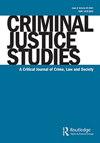确定毒品法庭毕业的预测因素:密尔沃基县成人戒毒法庭的评估结果
IF 1.1
Q3 OPERATIONS RESEARCH & MANAGEMENT SCIENCE
引用次数: 0
摘要
成人药物治疗法庭提供了一种替代监禁的方法,重点是治疗药物滥用问题和其他心理功能障碍。迄今为止的文献普遍表明,毒品法庭比其他刑事司法干预措施有效得多,但不同司法管辖区的毒品法庭效率差异很大。目前的研究能够窥探药物治疗法院的“黑盒子”,以了解哪些特征可能对这些法院的成功至关重要。威斯康辛州密尔沃基县成人药物治疗法庭的一项评估显示,接受治疗的年龄、种族和民族、前科、主要药物选择和拘留制裁都与个人从药物法庭毕业的可能性显著相关。将这些发现纳入文献提供了对毒品法庭有效性的额外检查,并进一步有助于对预测毒品法庭毕业的因素提供更全面的理解。因此,个人、社区和整个司法系统的健康可以得到显著改善。本文章由计算机程序翻译,如有差异,请以英文原文为准。
Identifying predictors of drug court graduation: findings from an evaluation of the Milwaukee County Adult Drug Treatment Court
ABSTRACT Adult drug treatment courts provide an alternative to incarceration that focuses on the treatment of substance abuse issues and other psychological dysfunctions. The literature thus far has generally indicated that drug courts are significantly more effective than other criminal justice interventions, yet rates of drug court effectiveness vary substantially across jurisdictions. The current study was able to peek inside the “black box” of drug treatment courts to understand which characteristics might be critical to the success of these courts. An evaluation of the Milwaukee County Adult Drug Treatment Court in Wisconsin revealed that age at intake, race and ethnicity, prior convictions, primary drug of choice, and custody sanctions were all significantly associated with an individual’s likelihood of graduating the drug court. The inclusion of these findings to the literature offers an additional examination of drug court effectiveness and further assists in providing a more comprehensive understanding of the factors that predict drug court graduation. As a result, the health of the individual, the community, and the justice system at large can be significantly improved.
求助全文
通过发布文献求助,成功后即可免费获取论文全文。
去求助
来源期刊

CRIMINAL JUSTICE STUDIES
OPERATIONS RESEARCH & MANAGEMENT SCIENCE-
CiteScore
2.80
自引率
5.60%
发文量
17
期刊介绍:
Criminal Justice Studies, a quarterly refereed journal, publishes articles that deal with substantive criminal justice and criminological issues. The journal welcomes all articles that are relevant to the issue of criminal justice, as well as those that may be outside the field but have relevancy to the topic of criminal justice. Articles that cover public administration, issues of public policy, as well as public affairs issues are welcome. The journal also publishes relevant literature reviews, research notes and summary reports of innovative research projects in criminal justice. Qualitative and quantifiable articles are sought mainly from academics and researchers in the field, though articles from professionals will also be considered.
 求助内容:
求助内容: 应助结果提醒方式:
应助结果提醒方式:


